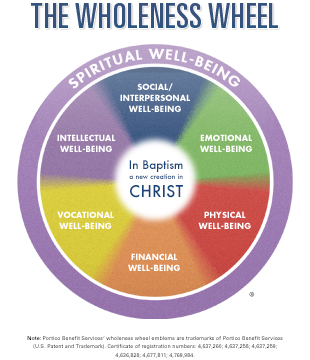The world is a broken place in need of healing. We seek health and wholeness in our personal lives, in our bodies, in our relationships. We all want to move from dis-ease into a life of wellness and God wants that for us too! During Lent this year, we have been focusing on how we can find such health and wholeness in all aspects of our lives. Using the Wellness Wheel as our guide, and trusting that our baptism is at the core of all healing, we will pursue health of body, mind and spirit in various areas of life. This week we conclude our journey by taking a closer look at social and interpersonal wellness.
We are created by God to be social beings, living in community and instructed to help and love each other. Yet, at times, this is easier said than done. Social and interpersonal wellness requires hard work and determination. However, the benefits to not only our relationships but overall health are incredible.
Close relationships positively impact your health
According to Mayo Clinic, having close friends and family on whom you can count has far-reaching benefits for your health. A strong social support network can be critical to helping you through the stress of tough times, whether you’ve had a bad day at work or a year filled with loss or chronic illness.
The positive effects of a support network include:
• Sense of belonging. Spending time with people helps ward off loneliness. Whether it’s other new moms, dog lovers, fishing buddies, or siblings, just knowing you’re not alone can go a long way toward coping with stress.
• Increased sense of self-worth. Having people who call you a friend reinforces the idea that you’re a good person to be around.
• Feeling of security. By reaching out and sharing yourself with others, you have the added security of knowing that if you start to show signs of depression or exhibit unhealthy lifestyle habits, your friends can help alert you to the problem.
While we may recognize that maintaining social well-being is beneficial to our health and overall wellness, it can be difficult to know what steps to take to grow in this area. Social relationships are all different and complex, as is each individual. However, we all can improve our social well-being through interaction, play and forgiveness.
1. Interaction
Take time to nurture your relationships with family, friends, congregation and co-workers. Whether it is a phone call, writing a letter, or setting aside time to be together, little steps of intentional interaction can help a relationship blossom, and in turn improve your social well-being. As you seek to build new friendships or reconnect with old pals, keep in mind that relational growth does not happen overnight. A recent study in the 'Journal of Social and Personal Relationships' found that, on average, it takes about “50 hours of time with someone before you consider them a casual friend, 90 hours before you become real friends, and about 200 hours to become close friends.” Simply put, relationships take time and intentionality.
2. Play
When was the last time you really played, let loose and got swept away in some joyous fun? For many adults, it has been a really long time since we have let our imaginations run wild and engaged in a playful act. Dr Stuart Brown, the founder of National Institute for Play, believes that we are wired up for play and that we grow through play. Play energizes us, relieves tension, births optimism, and catapults us to new behaviors and ideas. In his famous TED talk, he reminds us that “the opposite of play is not work, it’s depression.” With all of that in mind, play can be a catalyst for creativity, joy and relationships. Give yourself permission to play- tell a joke to a friend, join a team, work on a puzzle with a family member, or hang out with your pets. Let yourself play and laugh with others, and you are bound to feel a closer connection to them.
3. Forgiveness
Martin Luther King Jr. once said, “We must develop and maintain the capacity to forgive. He who is devoid of the power to forgive is devoid of the power to love.” If we want to develop healthy and loving relationships, forgiveness is an inevitable part of it. According to Kathi Norman of the University of Pennsylvania, failing to forgive has negative outcomes such as increased anxiety, depression, elevated blood pressure, vascular resistance, decreased immune response, and more. She concludes that “forgiveness, then, is a pathway to psychological well-being and health outcomes.” As we forgive, we free ourselves up to love others and to be loved. In forgiving, our wellness physiologically, physically, relationally and spiritually can all be improved. As we extend grace to others we are reminded of the incredible grace that has been extended to us.
Lord, help us to love like we have been loved, and forgive the way we have been forgiven. Open our eyes to the great blessings we have in one another. We long to experience freedom in our laughter, unhindered joy in our play, and health in our relationships. Amen.
Special thanks to all of our guest writers and Portico for their contributions during this Lenten journey towards health.






